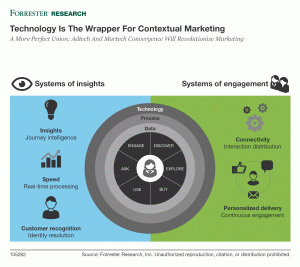
The Convergence of AdTech and MarTech is Happening: What to Expect in 2018
What are some ways AdTech and MarTech will continue to merge in 2018? As AdTech automates markets and MarTech scales business outcomes, benefits are slated to include better economic throughput and contextual marketing. What does this all mean to marketers?
While many questions remain about the ongoing merger of AdTech and MarTech methodologies, analysts say the advantages will ultimately outweigh the temporary pain of ironing out the logistics, including budget allocation.
The two most prominent benefits of the blended functions? One should be the expanded economic throughput enabled through the even wider variety of technology, data, media and content and contextual marketing, predicts Joe Stanhope of Forrester Research. The other will be the greater capacity for contextual marketing brought about when the two methodologies are combined, he says. Stanhope recently suggested the term “MadTech” in reference to that dual capability.

AdTech has traditionally concentrated on the automated-through-digital purchase and sale of ads, while MarTech has focused on the digital systems that manage customers, analytics, workflows and content; in fact, Gartner notes such technology now accounts for at least a third of all marketing budgets. Through the years, however, the methodologies have begun to overlap so much that it only makes sense to join their powers to gain economies of scale.
“Convergence impacts the future of thousands of vendors and their investors,” Stanhope noted on CMO.com earlier this year. “It affects day-to-day marketing operations for tens of thousands of brands and their agencies. Marketers need to know how convergence will play out and what it means for their stakeholders, especially their customers.”
Forrester predicts convergence will happen in five phases
Phase One: joint data has yet to be optimized prior to consolidation;
Phase Two: will bring about synergies between continuous engagement and delivery endpoints, among other outcomes;
Phase Three: will produce multiple niche vendors;
Phase Four: will produce more buy-side consolidation
Phase Five: we’ll see certain MarTech platforms delve into sell-side tech while others will pursue “back-office” tech
Some tips for forward-thinking marketers and adtech gurus at this point
- Consider which personnel you need to make the convergence work. People with knowledge and skill in both personalized content and media markets — aka “hybrid marketers” — are in demand.
- Expect CMOs across organizations to lead the movement toward convergence, since data will remain the driving factor behind converged campaigns.
- Expect massive consolidation among the 5,000-plus MarTech players nationwide. A record 115 mergers between AdTech and MarTech firms occurred during the first quarter of 2017 alone. “As MarTech solutions are increasingly forced to demonstrate both sustainability and profitability, the best will grow into the spaces left empty,” predicts Jim Yu in MarTech Today.
- Remember customers don’t care about the difference between AdTech and MarTech; they simply want smooth experiences and consistent brand messages.
- Emerging software may offer the best benefits of the two methodologies. Seek tools that can maximize the value of first-party data across all functions (i.e., use MarTech CRM data to power brand awareness campaigns while using an AdTech DMP for personalizing website or other retargeting campaigns).
Good news: Convergence should allow marketers to employ less technology to greater effect, says a recent Forrester report. Compare that to the situation as it is now – with 58 percent of B2C marketers wanting to reduce the number of technology vendors they use, but less than 20 percent believe they can actually deliver seamless customer experiences through just one.
Key benefits of the convergence
- Marketers will “master the customer journey” through precise personalization;
- MarTech vendors will thrive as AdTech helps them deliver real-time analytics at scale;
- AdTech vendors will use MarTech data for better customer targeting beyond acquisition;
- Agencies will gain new opportunities as marketing advisors, which may bring dismay to media buying agencies as they risk becoming less relevant
"Who will end up steering the car? The answer to that question will play out differently at each brand," Kingman speculates. "It’s actually a classic tech story of innovation followed by consolidation, where technology disruption eliminates the middlemen that offer limited value and creates economic efficiencies that empower end users."
Sounds like opportunity to us…
Share:
Got a project?
Harness the power of your data with the help of our tailored data-centric expertise.
Contact us